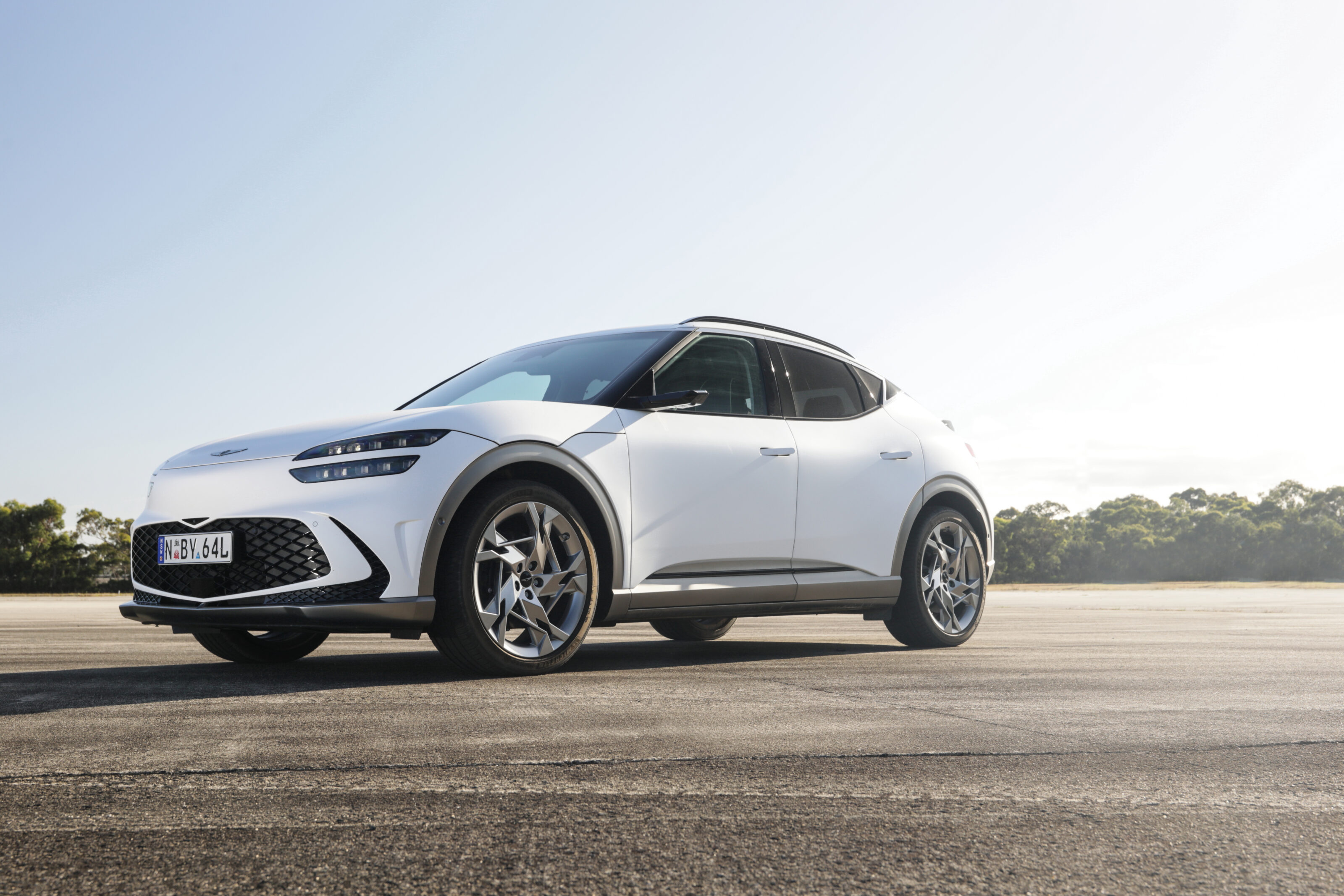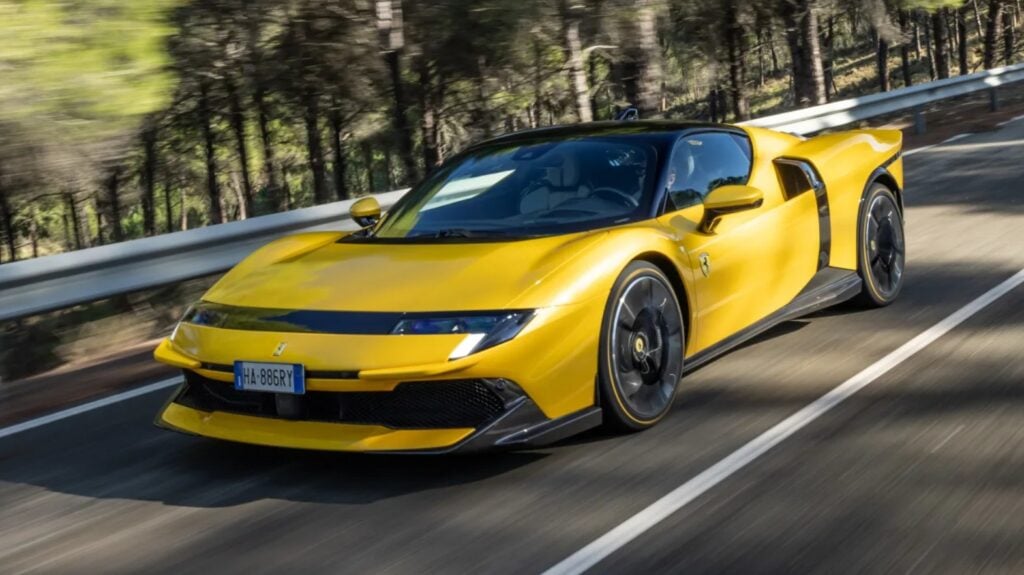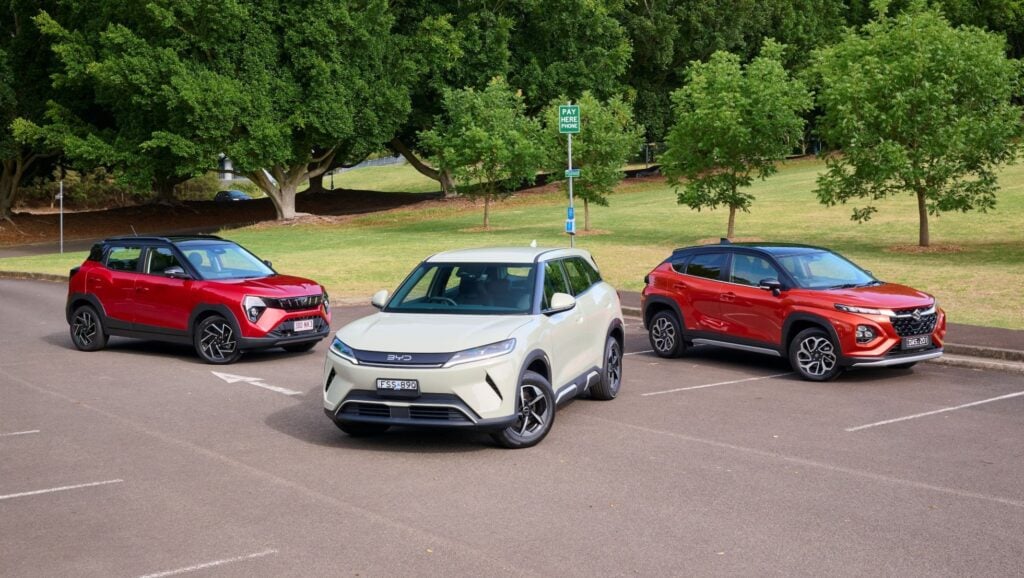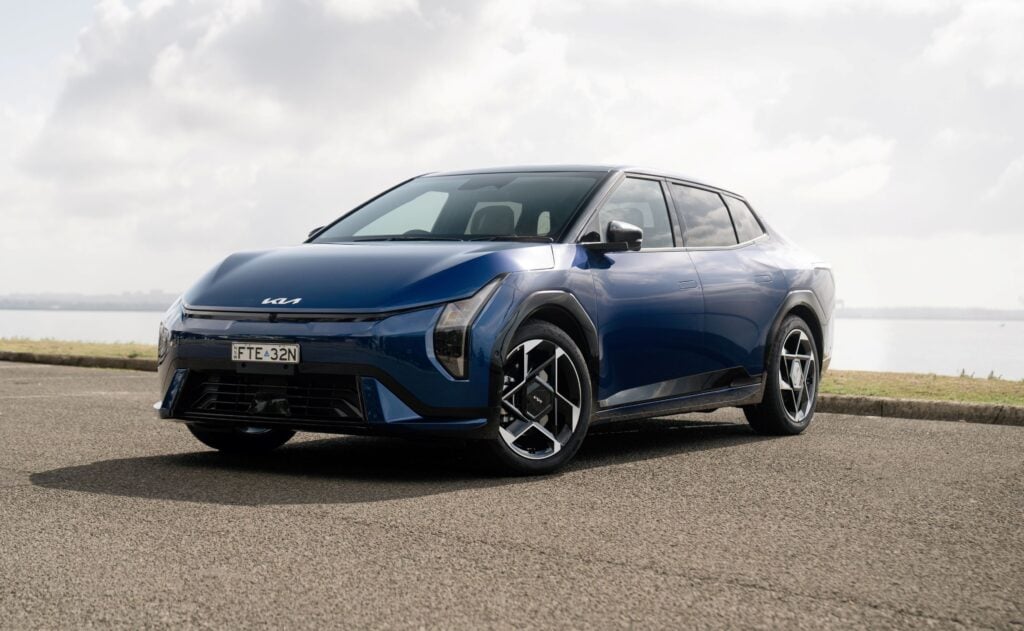Score breakdown
Things we like
- Striking unique styling, outside and in
- Five-year complimentary servicing & ownership benefits
- Both variants come fully features
Not so much
- Confused dynamics
- Inconsistent interior materials
- Are digital mirrors really 'progress'?
The Genesis GV60 is a curious thing, representing the Korean luxury car-maker’s first ground-up battery electric vehicle (BEV) offering.
Underpinned by the same E-GMP platform as the vaunted Kia EV6 and popular Hyundai Ioniq 5, the recipe for success is there.
Genesis has made strides to make the GV60 feel unique, leaning into its own distinctive, quirky design, blended with the marque’s inherent luxury positioning.
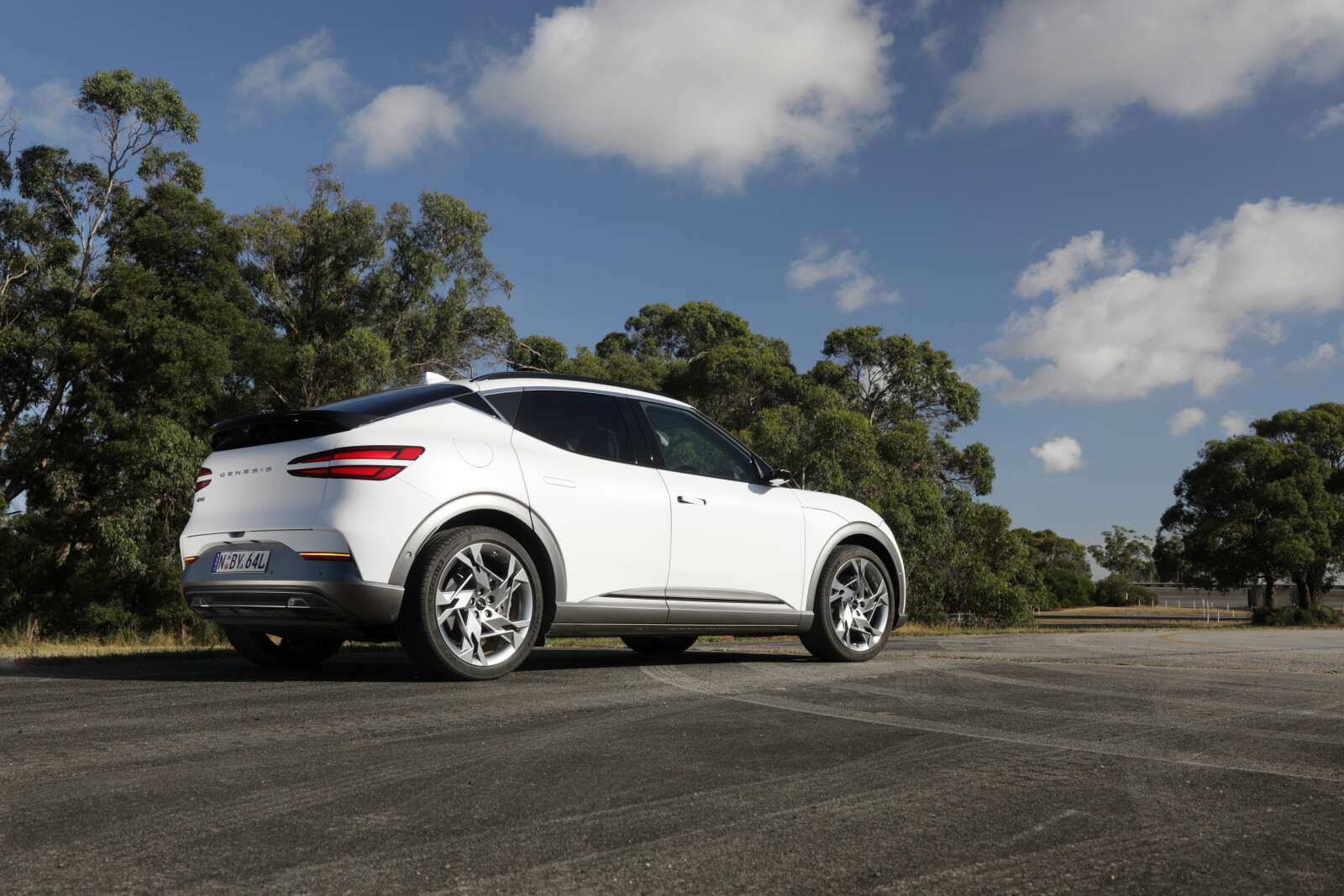
It’s no luxury barge, at least on paper. As the flagship Performance AWD vehicle, the twin-motor 360kW halo – resplendent with Boost mode – promises at least some dynamic appetite.
So how does it all come together? Let’s dig right in.
JUMP AHEAD
- How much is it, and what do you get?
- How do rivals compare on value?
- Interior comfort, space and storage
- What is it like to drive?
- How efficient is it?
- How safe is it?
- Warranty and running costs
- VERDICT
- Specifications
How much is it, and what do you get?
Genesis has made two GV60 grades available to the Australian market, both featuring 77.4kWh batteries with two motors (one front, one rear) and all-wheel drive.
The standard GV60 AWD asks from $103,700 (before on-road costs) and is driven by a 74kW front motor, combined with a 160kW rear motor, delivering a combined 234kW output and 470km of range on the WLTP cycle.
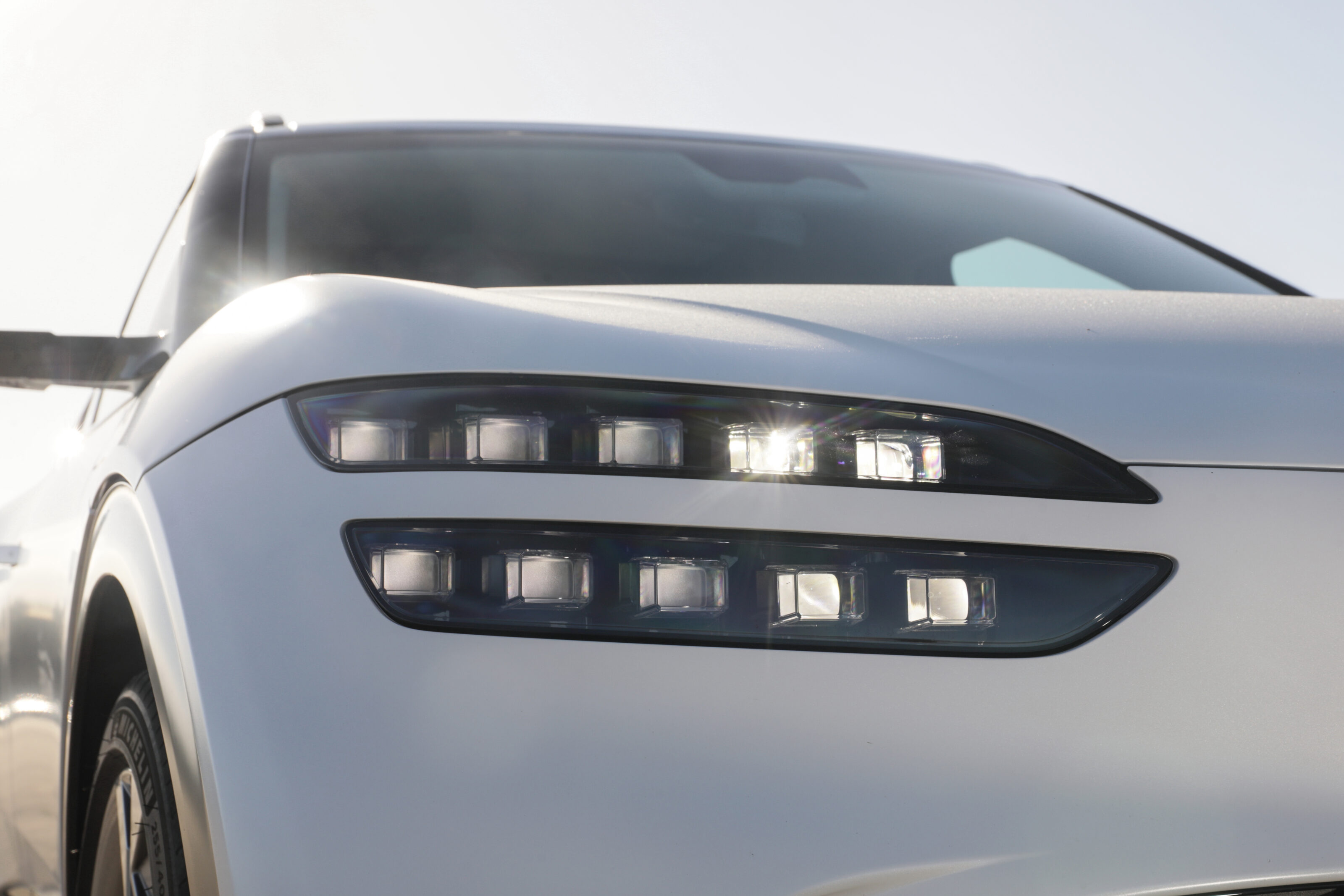
The flagship GV60 Performance commands a $7000 premium with a list price of $110,700 (before on-road costs). It harnesses the same basic configuration but is equipped with higher output motors, independently producing 180kW each for a combined 360kW output, with only a 4km penalty to its quoted WLTP range.
Genesis says the GV60 Performance can clock the 0-100km/h sprint in 4.0 seconds, compared to the standard vehicle’s 5.5-second claim.
Possessing the same 800-volt electrical architecture as its more affordable Hyundai Ioniq 5 and Kia EV6 relatives, the GV60 is able to ingest a maximum of 350kW, replenishing the battery from 10 to 80 per cent in just 18 minutes when using the right kind of DC charger in ideal conditions. Using a more common 50kW charger, the same 10-80 per cent refill will take a little over an hour.
The Genesis GV60 is also capable of V2L (vehicle-to-load) energy sharing.
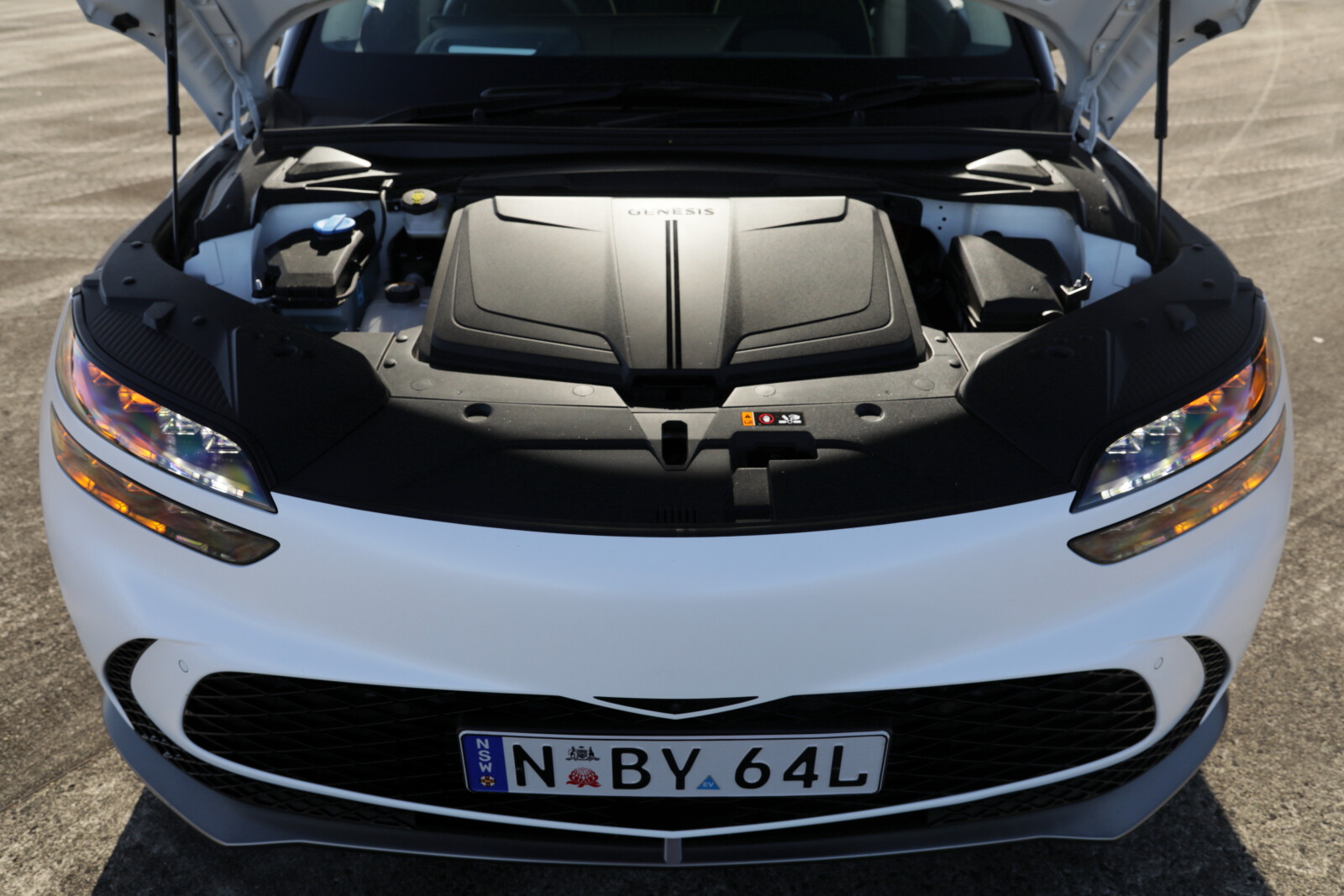
Elsewhere, the Genesis GV60 comes incredibly well-equipped as standard, featuring 20-inch alloy wheels, dual 12.3-inch widescreens, glass roof with power sunshade, augmented reality satellite navigation, head-up display, 18-way electrically adjustable driver’s seat with massage function, 17-speaker Bang & Olufsen sound system, Apple CarPlay and Android Auto, wireless phone charger, dual-zone climate control, digital side mirrors and a full safety suite including blind-spot cameras and adaptive headlights.
Flagship Genesis GV60 Performance AWD vehicles can be further distinguished by 21-inch alloys, Boost mode, adaptive ‘road preview’ suspension, electromechanical LSD, black monobloc front brake calipers and alloy pedals.
Genesis also provides a number of added ownership benefits for new GV60 buyers, including the choice of a complimentary five-year subscription to the Chargefox public charging network or complimentary supply and installation of a wallbox charger at home, as well as a five-year subscription to the ‘Genesis To You’ concierge program.
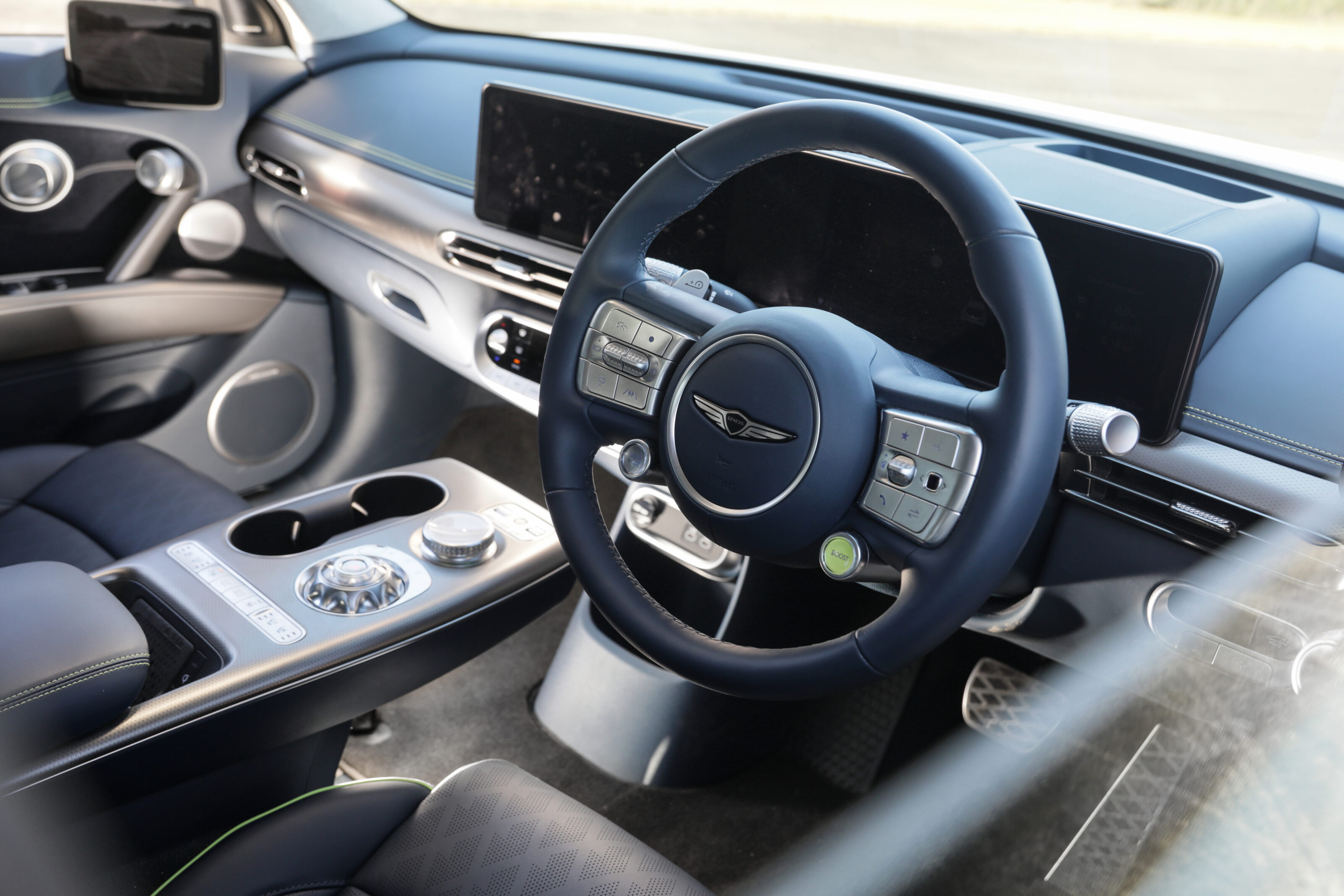
How do rivals compare on value?
The price of entry to this luxurious Genesis BEV is significant in comparison to its popular rivals.
Tesla is currently dominating the sector and, on price and power, it’s the top-shelf Model Y Performance that measures closest. The Model Y Performance both undercuts and outpunches the GV60, asking $94,900 (before on-road costs) while delivering a greater 413kW output and superior 514km of WLTP range. It is not exactly luxurious, though.
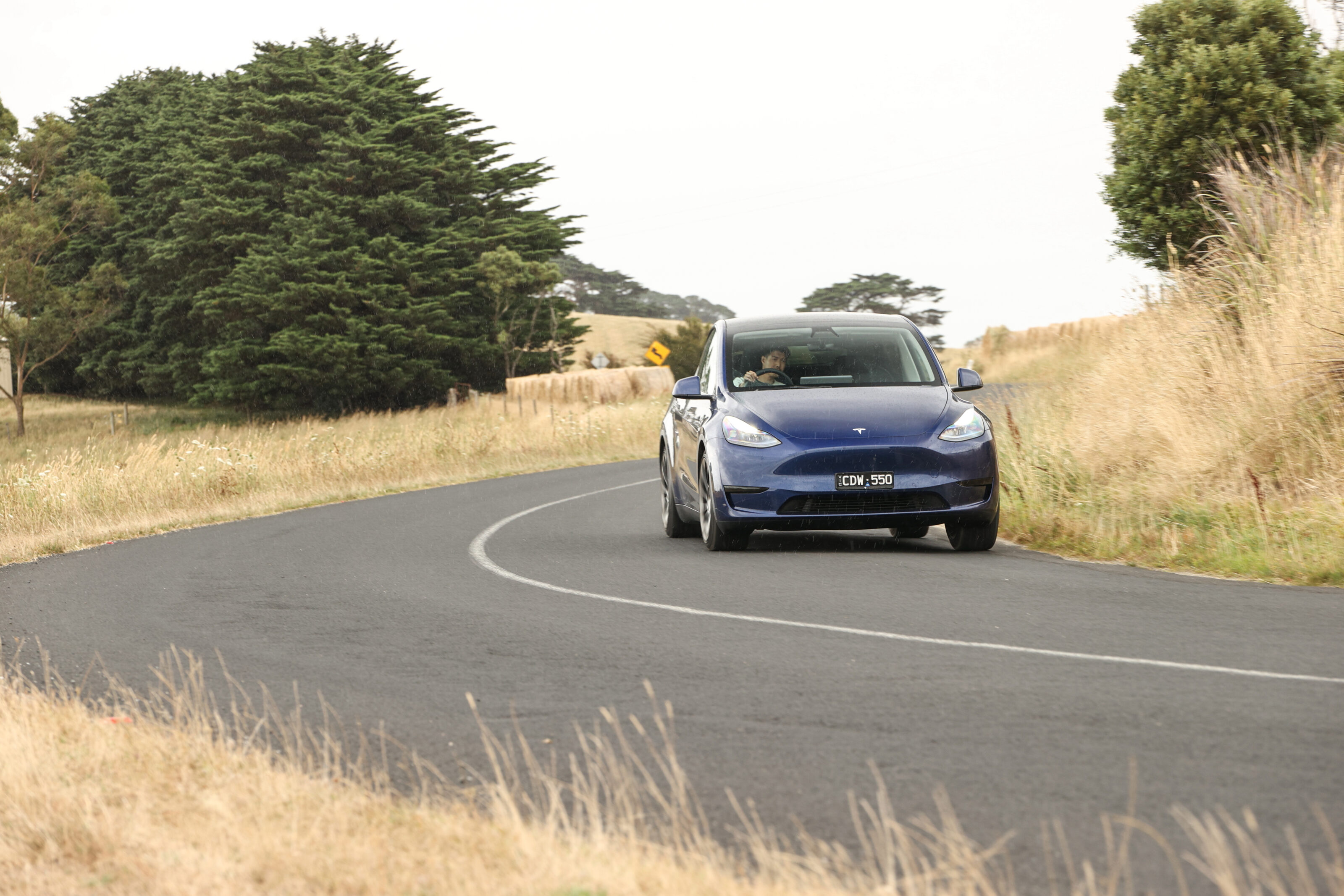
It’s impossible not to consider the GV60’s Korean counterparts (and platform mates) at Hyundai and Kia, too.
The Hyundai Ioniq 5 range is currently headlined by the Epiq AWD variant, asking $85,000 before on-road costs, producing 239kW and boasting 545km of WLTP range. The Ioniq 5 currently lacks a serious range flagship but a high-performance N-badged version is expected to land locally in 2024. This, however, will take a much more driver-focused dynamic approach, in comparison to the distinct luxury brand personality of Genesis.
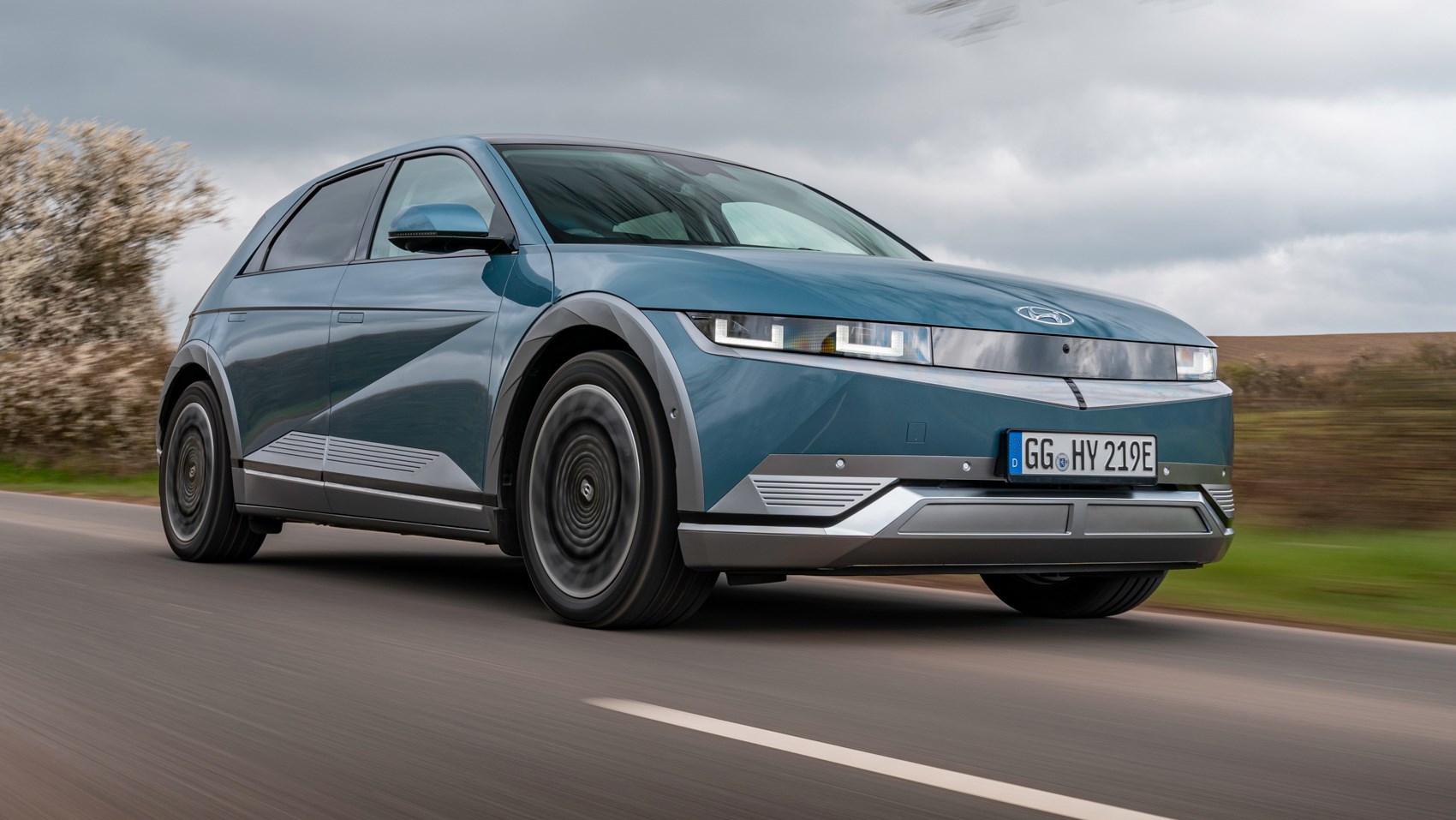
Kia, however, has recently introduced its flagship EV6 GT which, at $99,950 before on-road costs, nudges the standard GV60 on price, but outguns the Genesis with a shocking 430kW peak output and blinding 3.5-second 0-100km/h time.
This comes at the expense of range, which drops to 424km, and like the Tesla, you are paying for hi-tech performance rather than high-end interior ambience.

Best Electric Cars, $80k-100k: Luxury EVs tested
This is part three of our price-based EV buying guide, comparing Australia’s electric cars priced between $80,000 and $100,000
Interior comfort, space and storage
Compared to its striking platform mates, the Genesis GV60 doubles down on a fashion-forward design targeting youthful early EV adopters with a heavy focus on tech and equipment.
While the friendly Hyundai Ioniq 5 channels an airy lounge-like feel and Kia’s EV6 toes a decidedly more spaceship-like vibe, the GV60 occupies the area in between, with its rotating alien crystal ball shifter, metal-look switchgear and nary a sharp line, angle or edge to be found.

Just like the exterior, the GV60’s cabin design is tremendously striking, doubly so as our test car comes swathed in deep blue leather accented with lime green piping.
We’ll leave it to you to decide whether it all comes together in a ‘cool’ or ‘kitsch’ fashion, but a benefit of the two-pronged GV60 range is that standard equipment and features are virtually lineball between the two variants. It means you don’t have to spring for the flagship Performance to net niceties such as front and rear heated seats, head-up display and Bang & Olufsen stereo.
Other features unique to the Genesis include facial recognition and fingerprint scanning technology, enabling certain people to unlock and start the vehicle without a key.
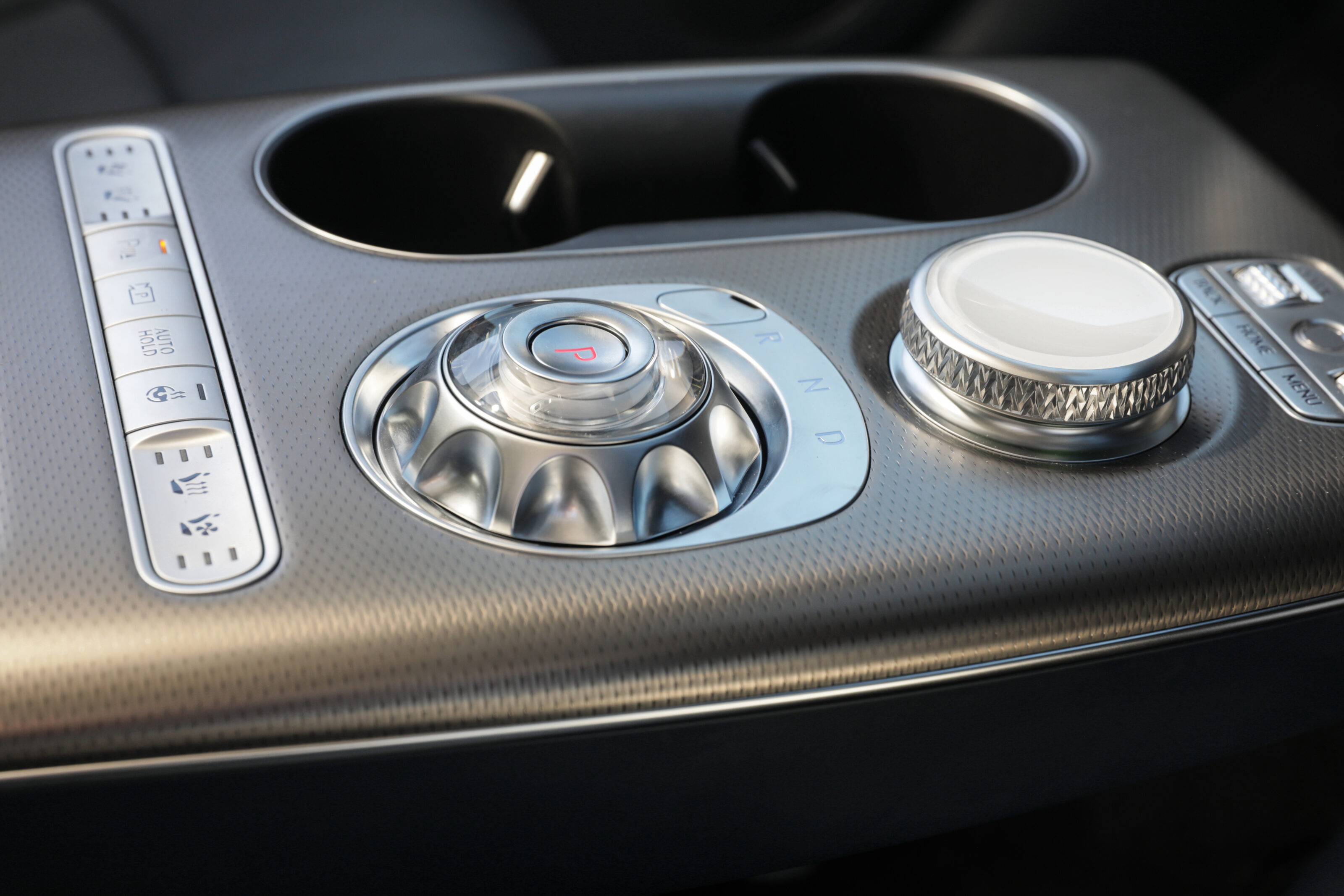
There is a respectable amount of adjustment to the driver’s seat and steering column, though we’d like to see a slightly lower seating position in a car that promises this much power and performance.
Much of the artificial leather and soft-touch materials are noticeably plusher than the GV60’s Korean counterparts, but a clear link to the basic architecture and hardpoints remains. Some silver-painted switchgear was beginning to show signs of wear around the edges, raising some questions about real-world longevity.
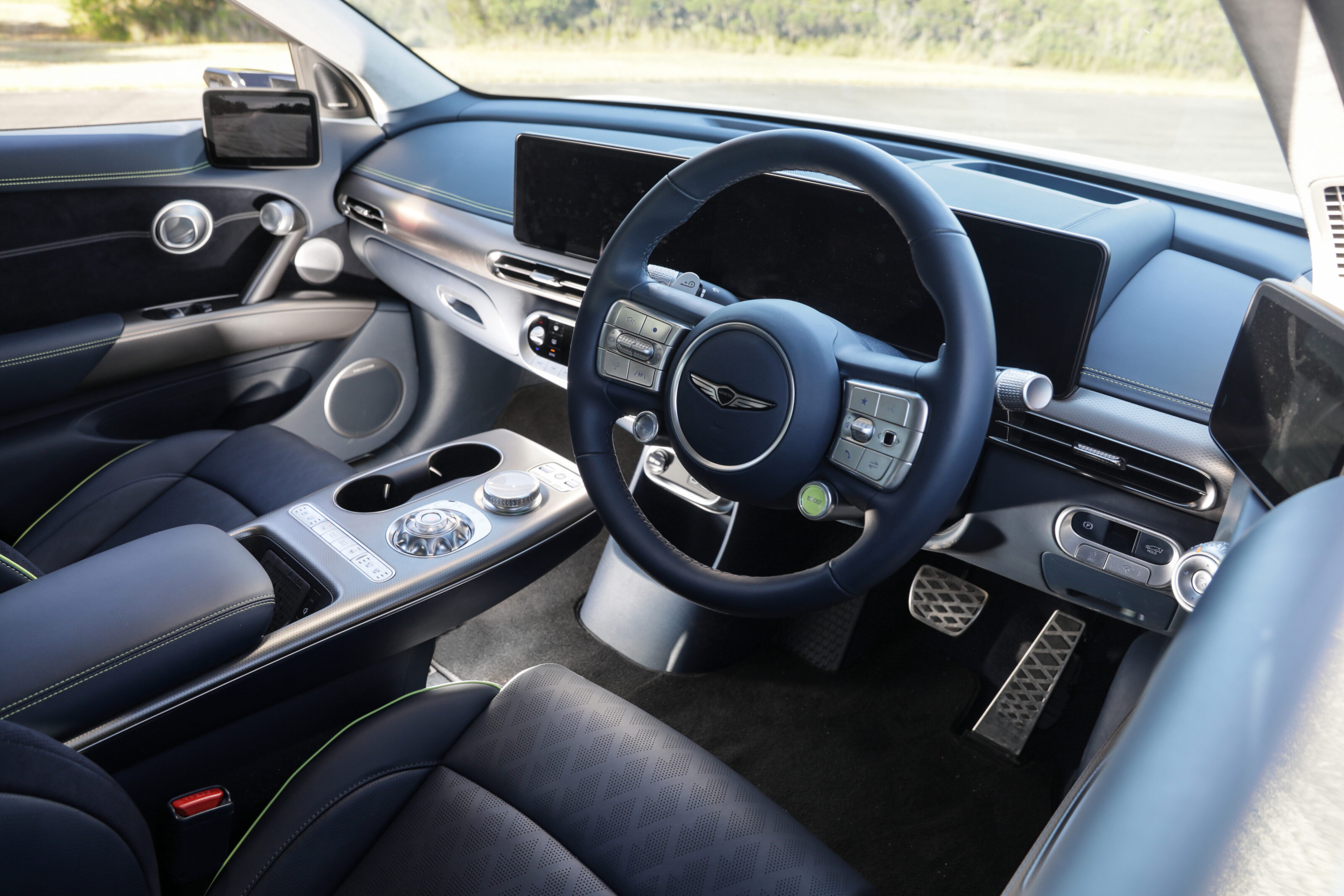
We must also mention those divisive digital mirror cameras. Striking they may be, but we can’t help but feel like they’re something of a needlessly over-engineered solution to a problem that didn’t exist.
The camera lenses operate on a somewhat unconventional visual plane, which is initially a bit disorienting to a driver used to conventional mirrors, and the monitors themselves occasionally appear somewhat desaturated, requiring further concentration and processing to engage with.
Storage-wise, there’s a large central cubby with netted door pockets, cup holders and a wireless phone charging pad.
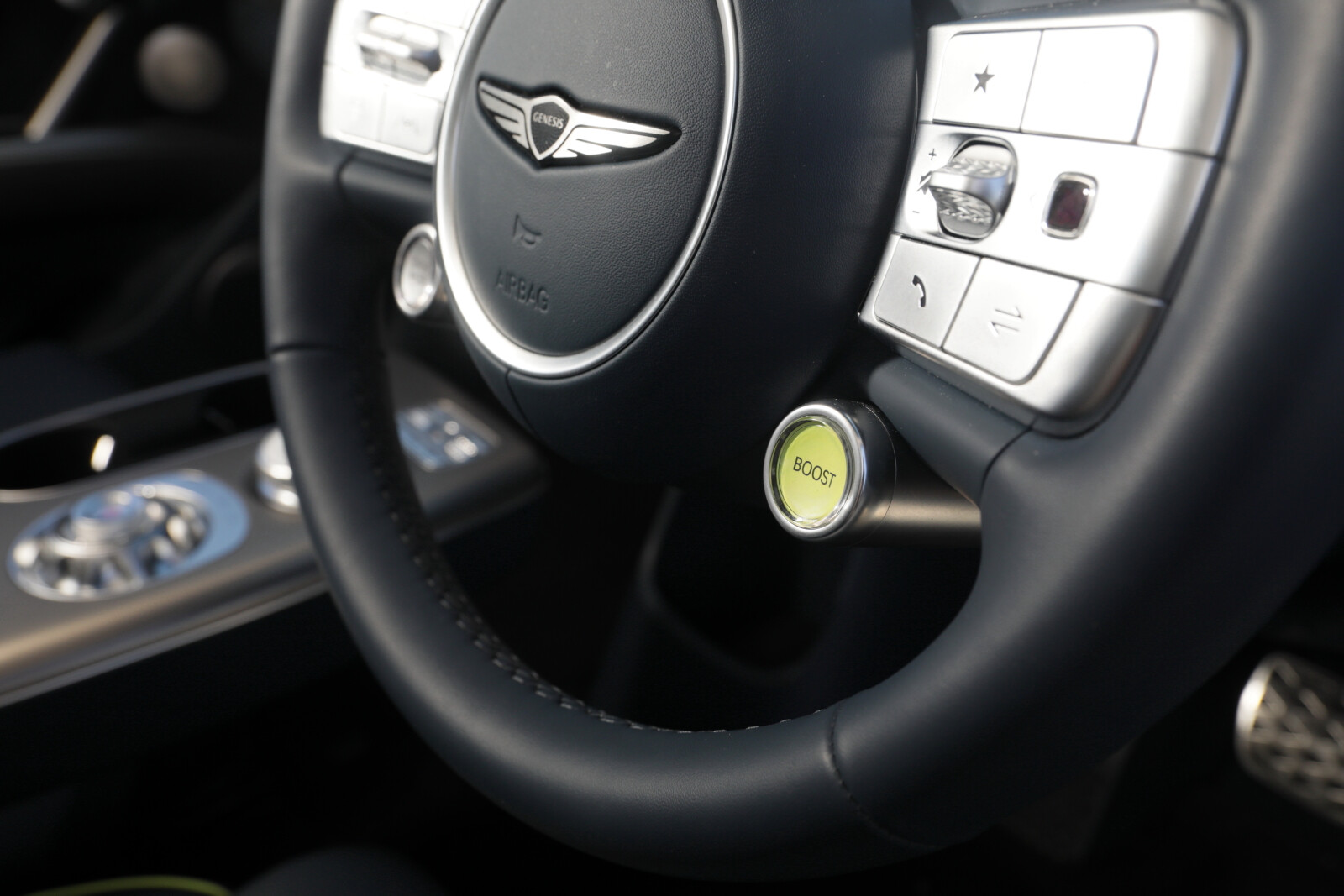
The second-row seats are hampered by a raised floor containing the battery pack beneath. Sadly, this encroaches on toe room and subsequently under-thigh support for long-legged passengers. The headliner has been considerately scalloped to aid headroom, but it ultimately feels more hemmed-in than the GV60’s platform mates at Hyundai and Kia.
Genesis swings back, however, with luxuries such as second-row seat heating, integrated window blinds, two USB-C ports, cup holders in the central armrest and doors, as well as auxiliary air vents mounted in the B-pillars.
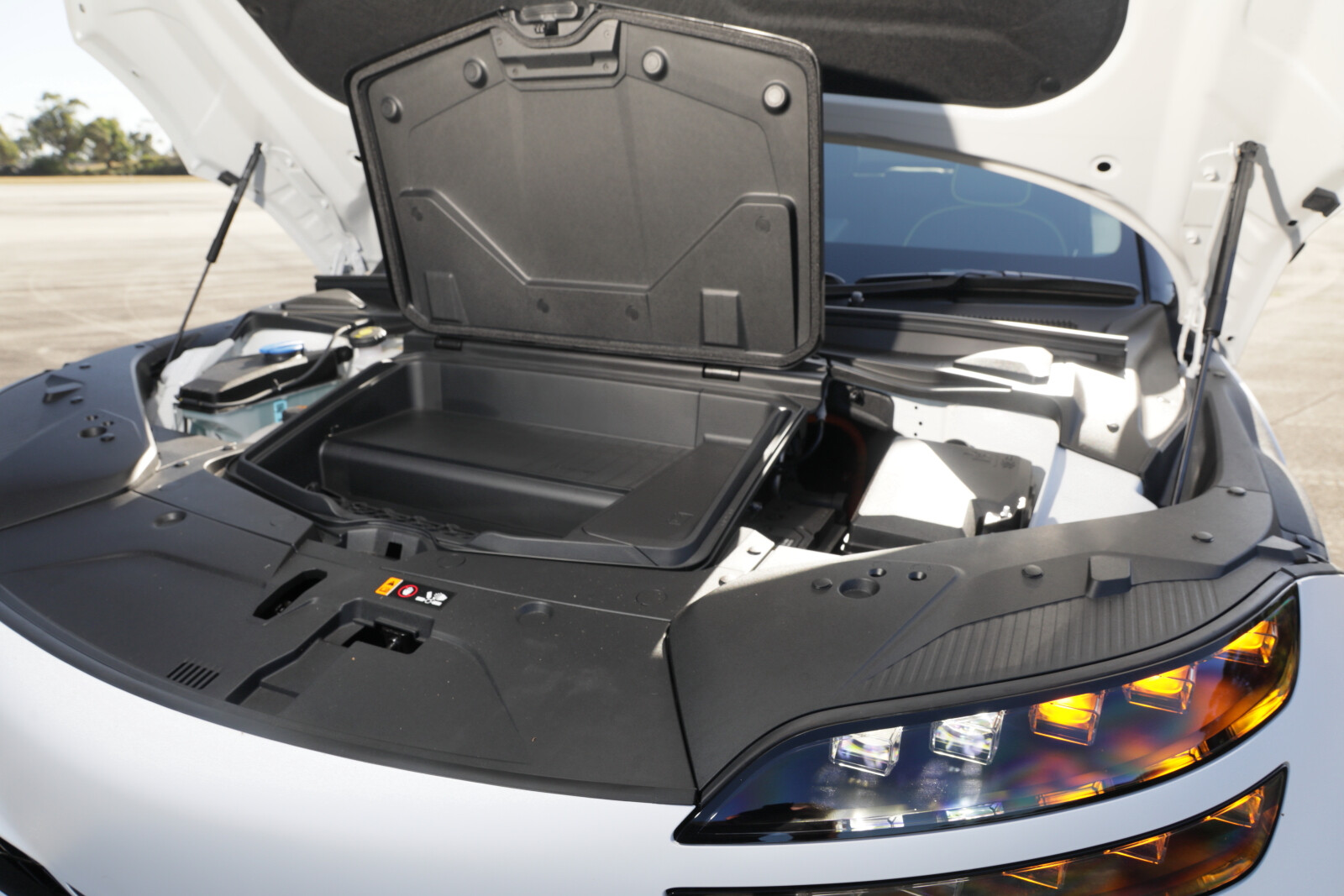
Genesis GV60 boot space
Below the sharply raked rear windscreen sits a 432L boot, which expands to 1460L with the 60:40 second row folded. With all seats in place, the GV60 is down on boot capacity against the EV6’s 480L figure and the Ioniq 5’s 527L. All three are bolstered by a small 20L storage bin under the bonnet.
What is it like to drive?
| 2023 Genesis GV60 Performance AWD drivetrain | |
|---|---|
| Battery size | 77kWh |
| Drive | dual motor, all-wheel drive |
| Power | 320kW (360kW in Boost mode) |
| Torque | 605Nm (700Nm in Boost mode) |
| Driving range | 466km (WLTP) |
| 0-100km/h | 4.0sec |
| Charging speed | up to 350kW DC |
| Charging time | 10-80% 18min DC |
With the well-known instant acceleration characteristics of electric vehicles, you expect the Genesis GV60 to be fast, and it is!
Even without engaging the steering wheel-mounted ‘Boost’ button, from a standstill or a roll the GV60 Performance AWD gains speed at a rate beyond the friendly soft Hyundai Ioniq 5, and even the second-from-top Kia EV6 GT-Line.
Hitting the ‘Boost’ mode deploys all 360kW/700Nm (instead of the default 320kW/605Nm) for ten seconds at a time. The power delivery is incredibly linear and easy to key into.
While the steering varies little in load and is easily predictable, it often demands small corrective inputs through a constant-radius corner.
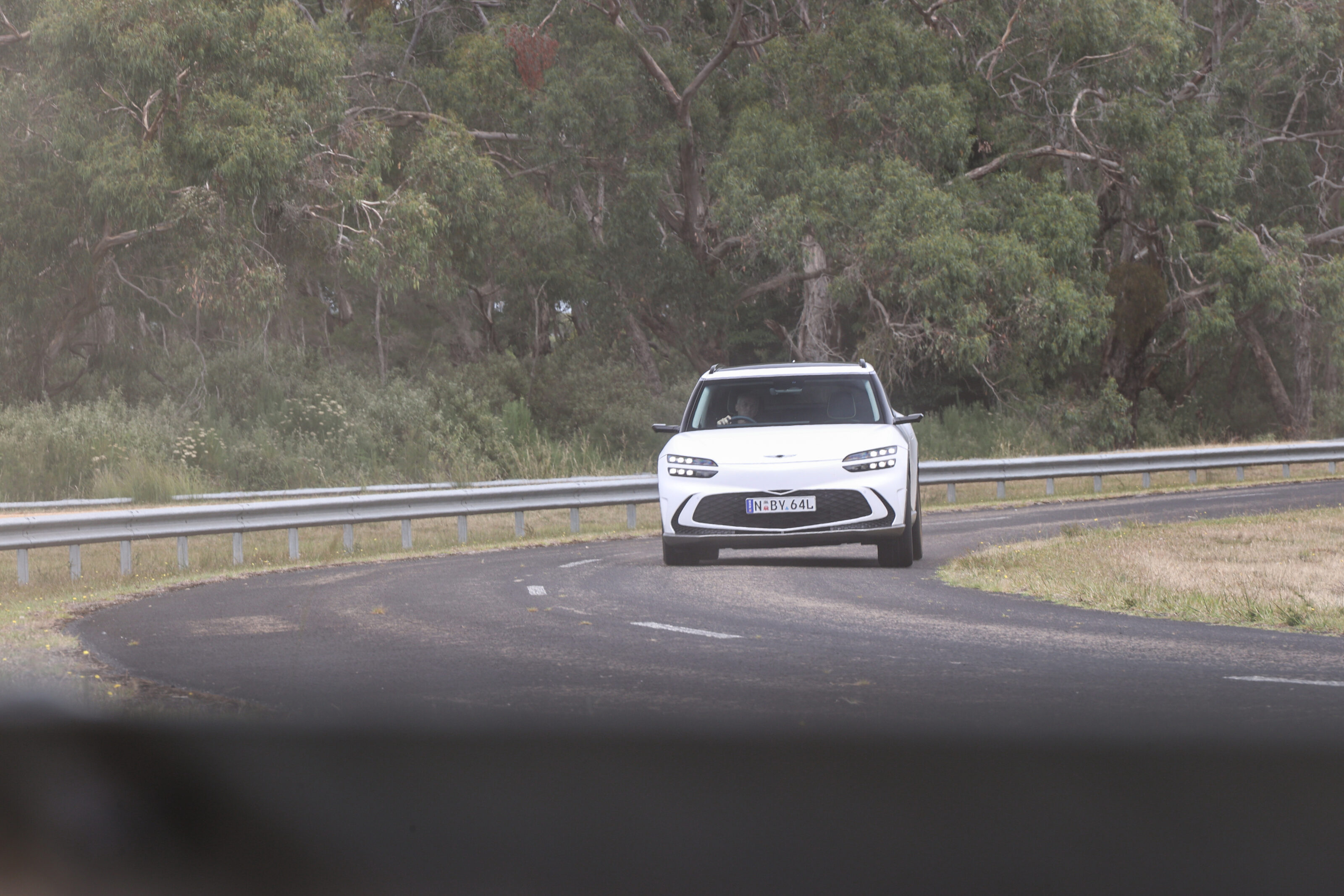
Things are less polished when it comes to ride and handling, despite the GV60 sharing its E-GMP bones with some accomplished models.
Although matching the Kia EV6 with a 2900mm wheelbase, the GV60 doesn’t boast quite the same level of all-round balance and composure.
Unlike Kia’s EV6, Australian-spec GV60s aren’t bestowed with a local suspension tune, instead adopting calibrations from global settings.
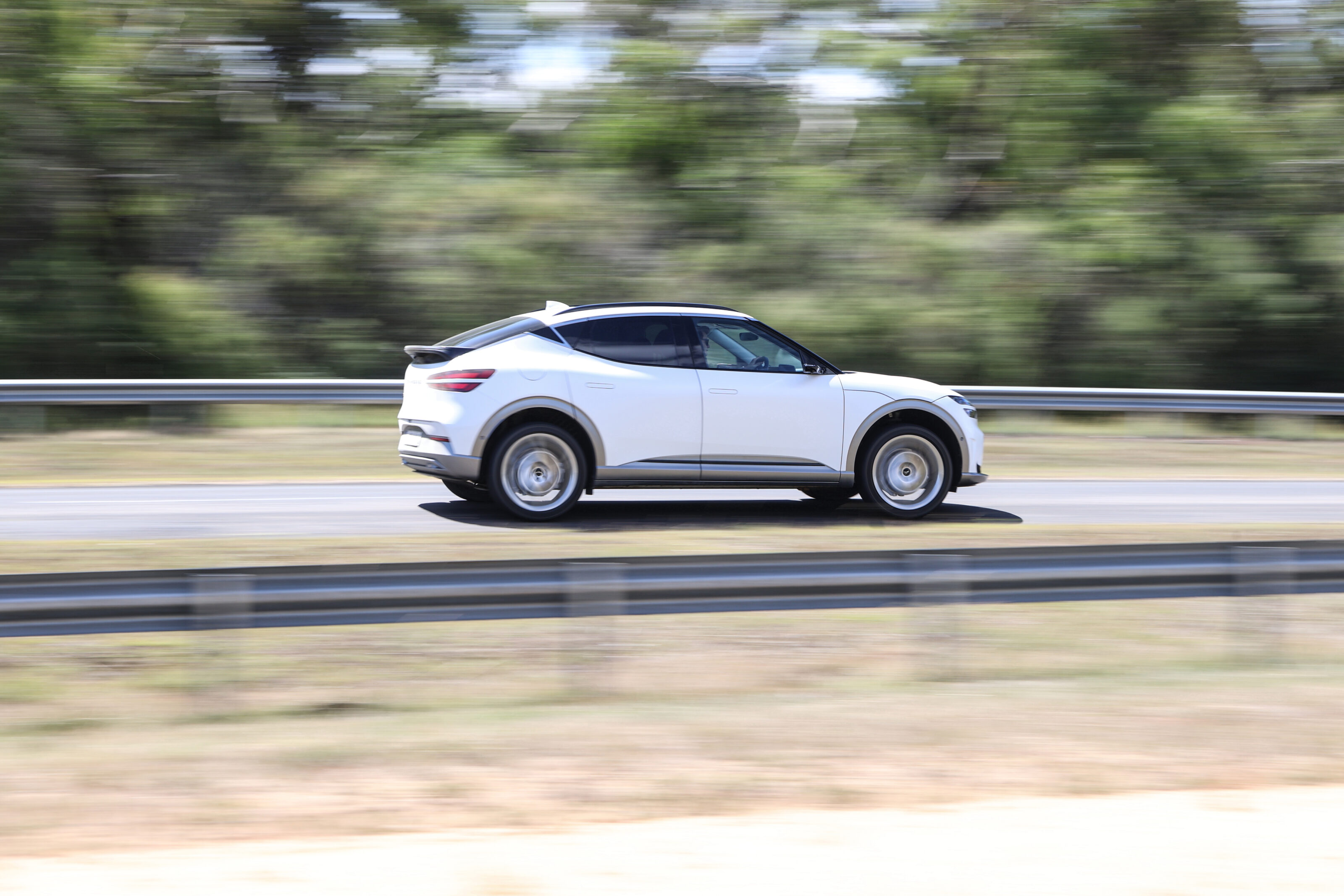
The GV60 does lack the pronounced rocking horse-like pitch and dive of a Hyundai Ioniq 5 but is less contained under lateral forces, where the 2.2-tonne Genesis bucks and heaves over mid-corner bumps.
As a result, it never delivers enough predictability in its chassis to fully exploit the meaty power outputs, with lingering secondary body movements hampering rapid direction changes.
Conversely, when you dial it back to a cruise, it’s never quite as plush or comfy as you’d expect or like, despite the Performance variant’s dynamic and predictive ‘road preview’ electronic dampers.
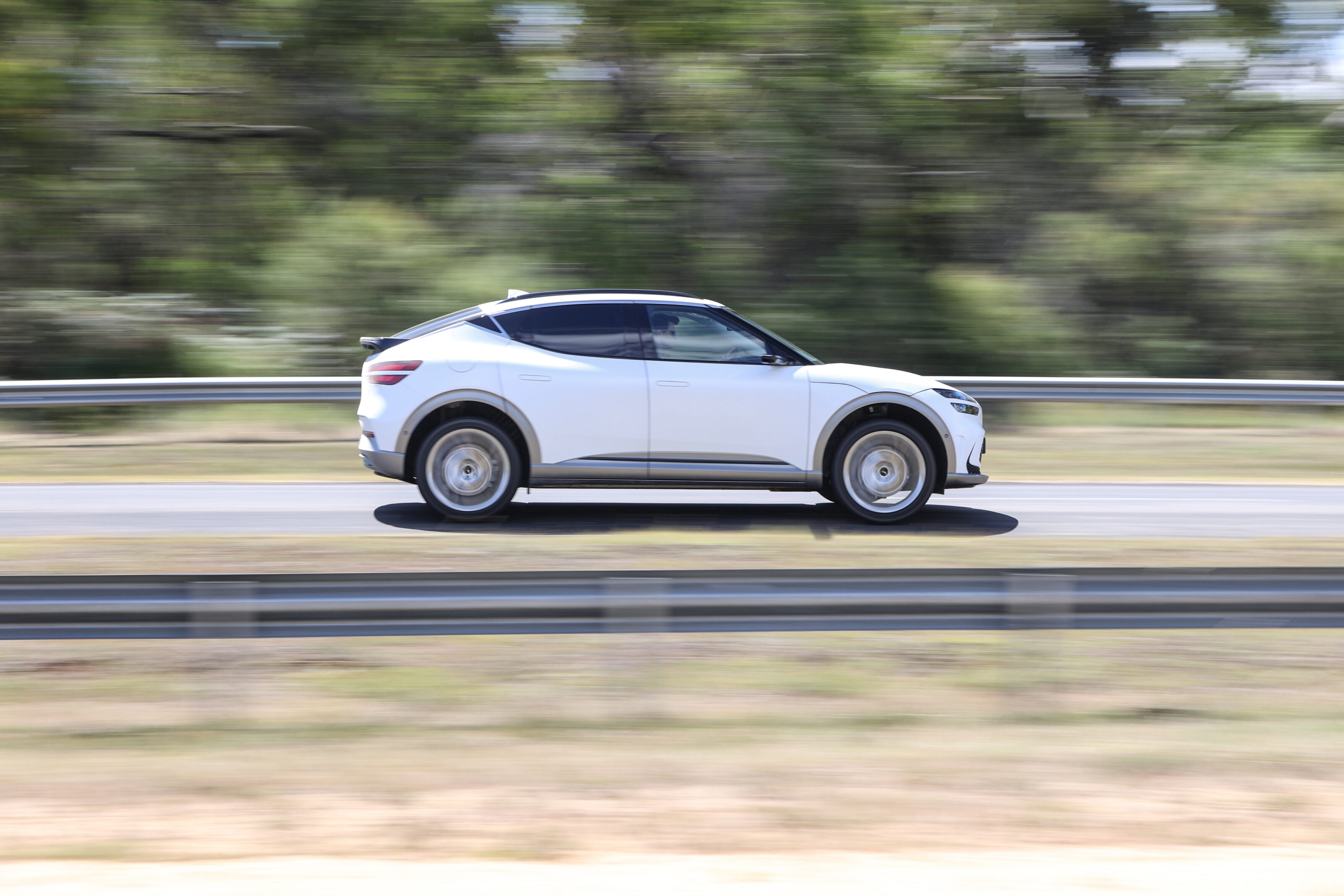
Elsewhere, it’s perfectly quiet with good noise, vibration and harshness suppression.
Overall, the GV60 is a competent car, albeit one with its quirks requiring the driver to adjust in reaction, and one that falters in the final 10 per cent of overall vehicle cohesion, when measured against its closely related rivals.
How efficient is it?
Genesis claims the GV60 to operate at around 19kWh/100km on the WLTP cycle.
Real-world EV efficiency depends heavily on how and where it’s driven, but previous mixed-condition tests have seen us return figures of around 23-25kWh/100km.
If you’re lucky enough to stumble upon a 350kW ultra-rapid charger, the GV60 is capable of replenishing its battery from 10 to 80 per cent in just 18 minutes, under ideal conditions (including ambient temperature, battery temperature and stability of energy supply to the charging station).
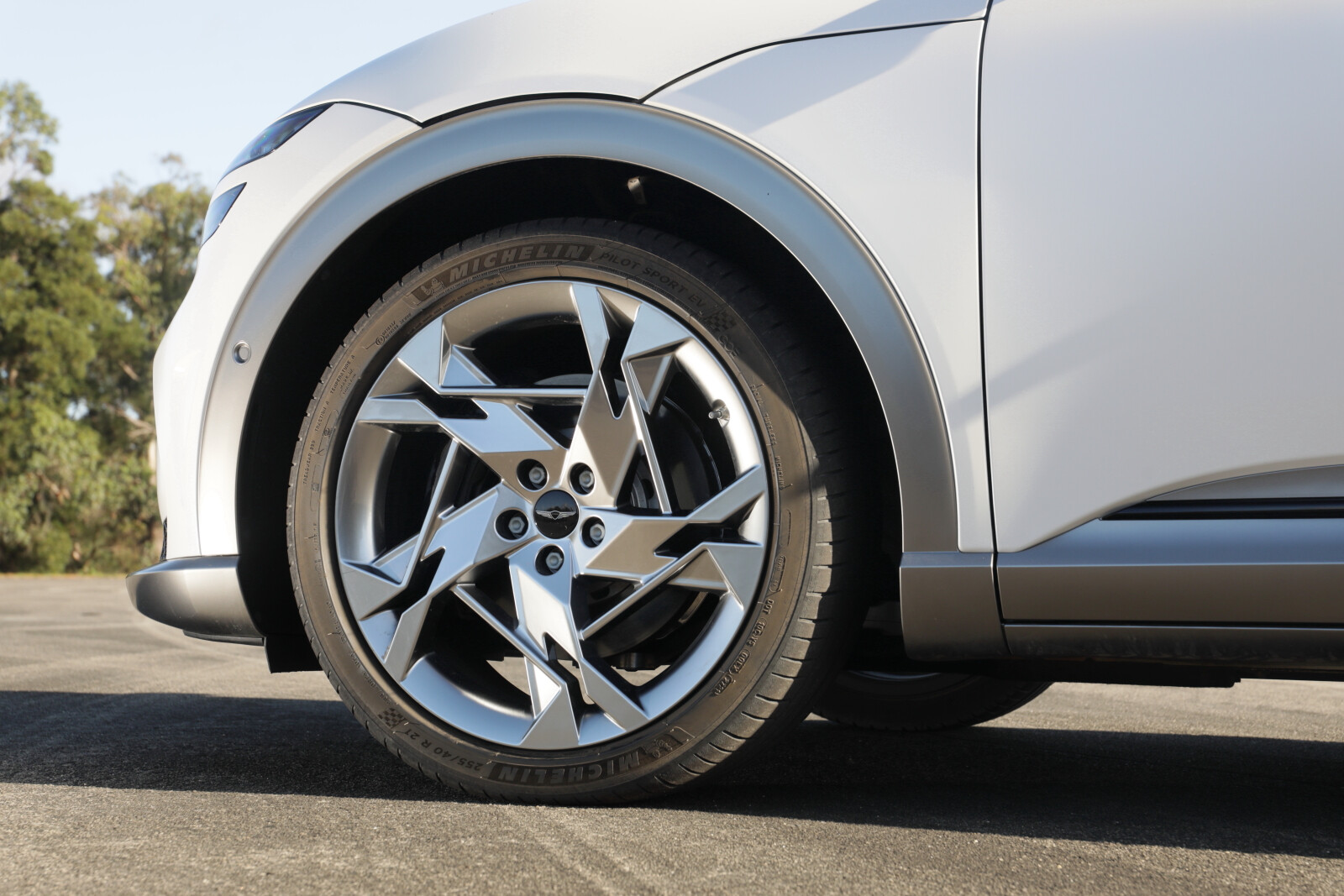
How safe is it?
The Genesis GV60 was awarded a five-star safety rating by ANCAP in 2022, which applies to both variants.
Its eight-piece airbag suite comprises dual frontal, side chest-protecting and side curtain airbags, plus a driver’s knee and front central cushion.
On the active safety front, the Genesis GV60 packs blind-spot monitoring with collision avoidance assist, driver attention warning, lead vehicle warning, autonomous emergency braking with car, pedestrian, cyclist detection and junction assist, evasive steering assist, lane change assist, lane-keep assist, high-beam assist, adaptive lighting, adaptive speed limit assist, reverse AEB, rear cross-traffic collision avoidance assist, rear occupant warning, safe exit assist, adaptive cruise control, 3D camera view and more.
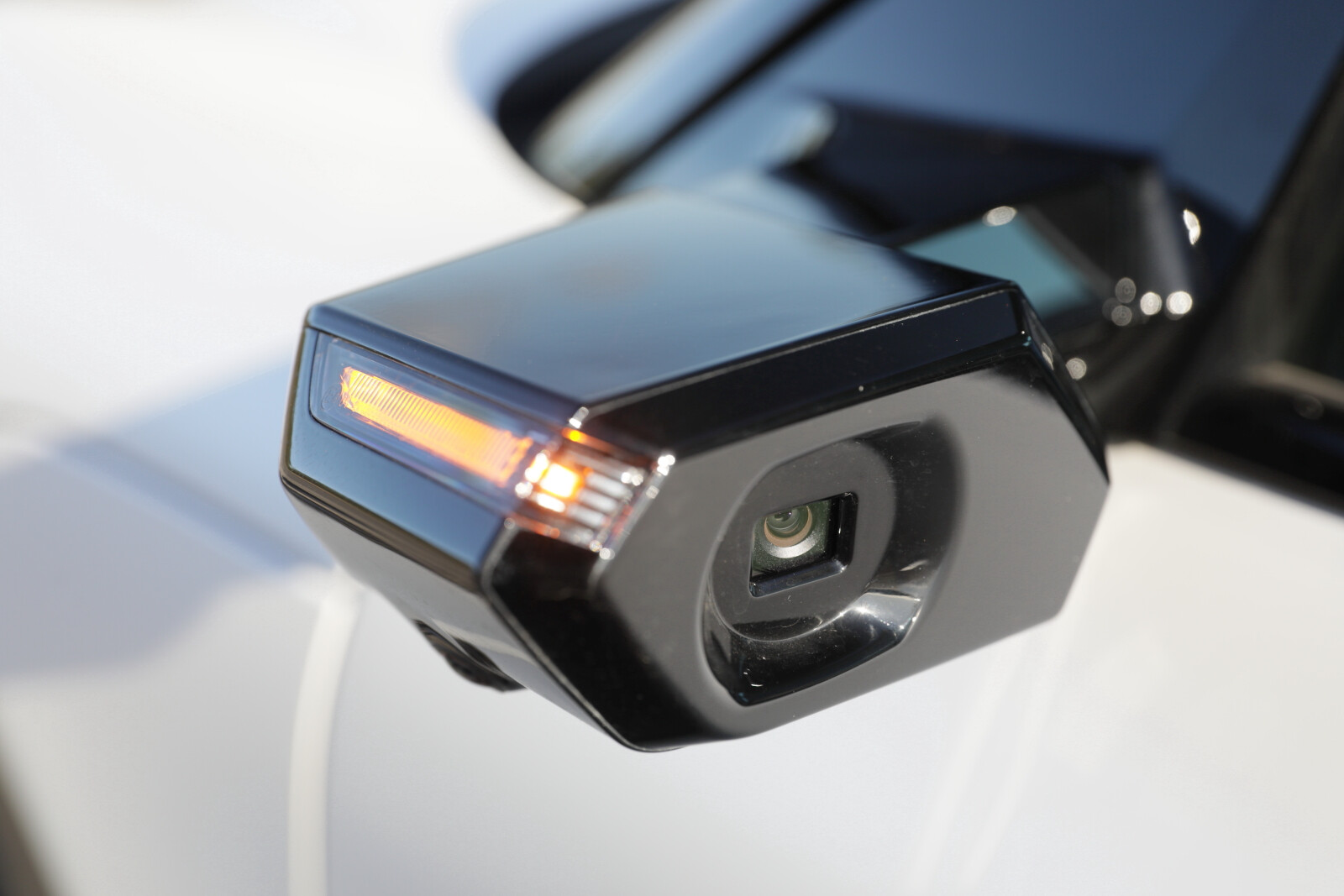
Warranty and running costs
All new 2023 Genesis GV60s are covered by the brand’s five-year, unlimited-kilometre warranty, which includes five years of complimentary scheduled servicing.
Other ownership benefits include an eight-year battery warranty, five years of ‘Genesis To You’ valet and concierge service, 10 years of 24/7 roadside assistance, 10 years of complimentary map updates and a choice of five-year Chargefox subscription or free installation of a wallbox charger at home.
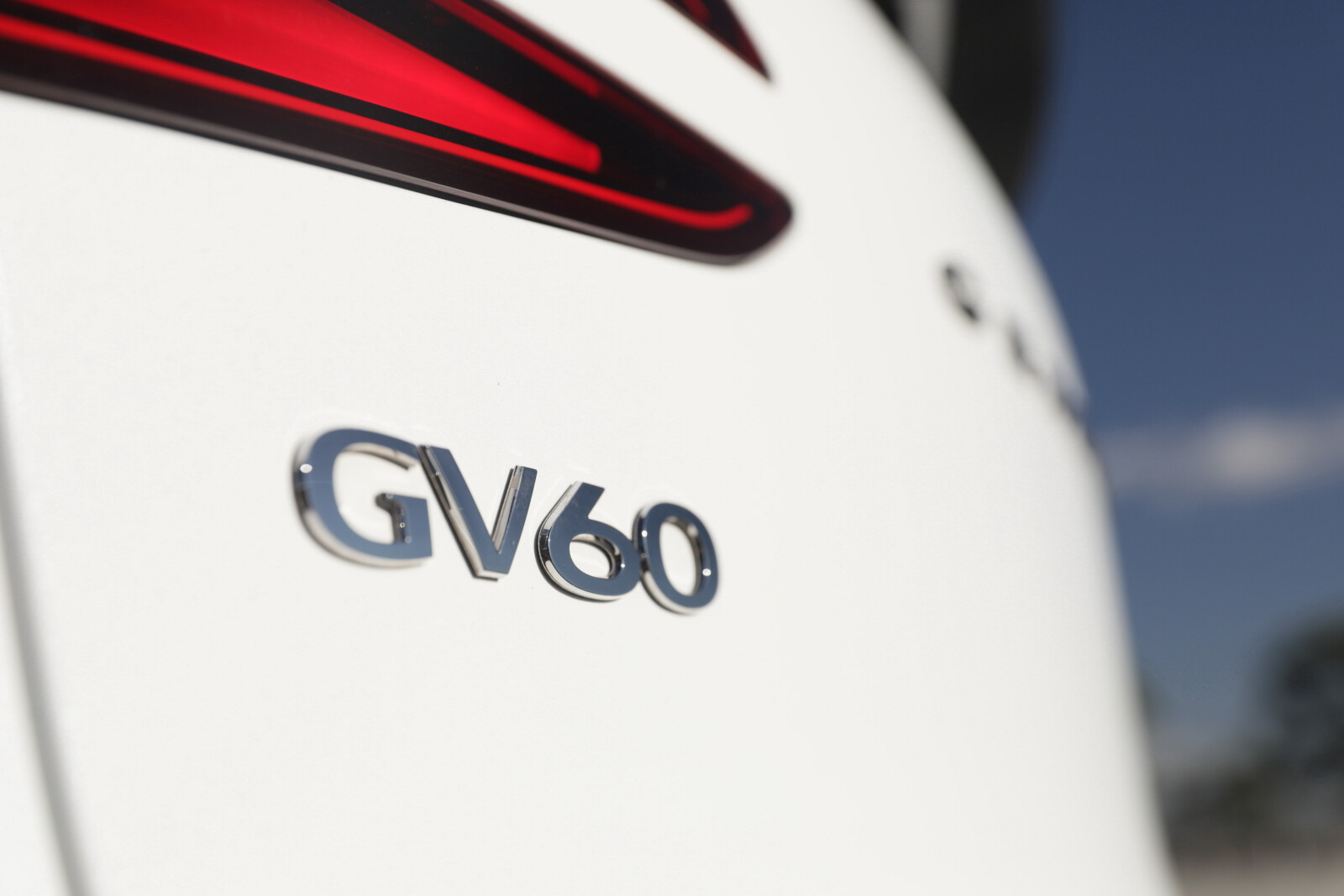
VERDICT
It’s a curious thing, this Genesis GV60. It emerges unique and distinct as a style-driven youthful offering, delivering a tech-laden experience wrapped in plush leatherette.
Some patchy cabin switchgear tactility mixed with such glamourised design elements leave the GV60 feeling somewhat confused when faced with a lime green ‘Boost’ button and the dramatic squat of its urgent 360kW delivery.
This is a striking thing to behold and its cabin will certainly dazzle anyone who experiences it, but as an exercise in overall vehicle cohesion, the GV60 does not quite deliver the ride comfort to match its plush and luxurious interior while failing to fully exploit its ample outputs when exploring its dynamic abilities.
When compared amongst the wider E-GMP family tree, the GV60 lacks the Pixar-like softness of the Hyundai Ioniq 5 and the all-round dynamic scope of Kia’s EV6, instead falling somewhere in between.
What Genesis has achieved here, however, is creating something truly unique.
EVs are no longer a fringe product and for the fashion-forward inner-city commuters who are looking to make the switch but still want to stand out, Genesis may have just the car for you.
| 2023 Genesis GV60 Performance AWD w/ Luxury Package specifications | |
|---|---|
| Body | 5-door, 5-seat small SUV |
| Boot min / max | 432L / 1460L |
| Drive | all-wheel |
| Powertrain | dual motor, 77kWh battery (466km WLTP) |
| Max power | 320kW (360kW in Boost mode) |
| Max torque | 605Nm (700Nm in Boost mode) |
| Transmission | single-speed reduction gear |
| Weight | 2210kg |
| L/W/H/W-B (mm) | 4515/1890/1595/2900mm |
| 0-100km/h | 4.0sec |
| Price | $110,700 / $112,700 as-tested + on-road costs |
| On sale | now |
Score breakdown
Things we like
- Striking unique styling, outside and in
- Five-year complimentary servicing & ownership benefits
- Both variants come fully features
Not so much
- Confused dynamics
- Inconsistent interior materials
- Are digital mirrors really 'progress'?
We recommend
-
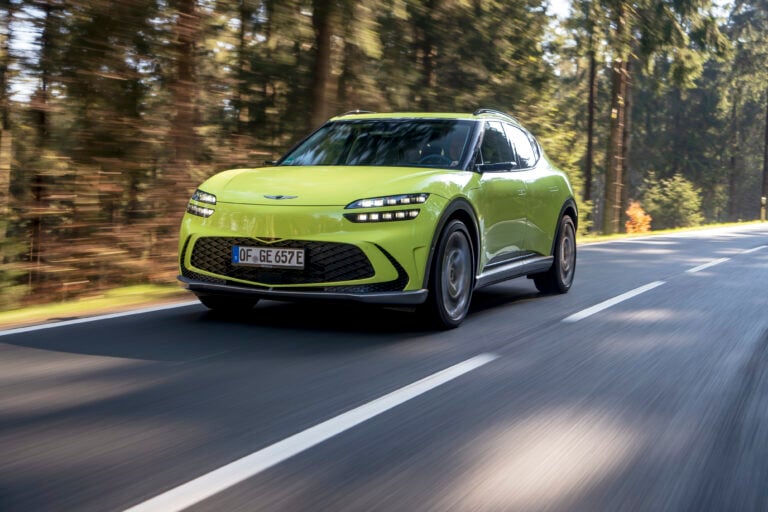 News
News2023 Genesis GV60: Australian timing, pricing and features confirmed
The Genesis GV60, its first electric car, is here! Two grades available, starting at $103,700
-
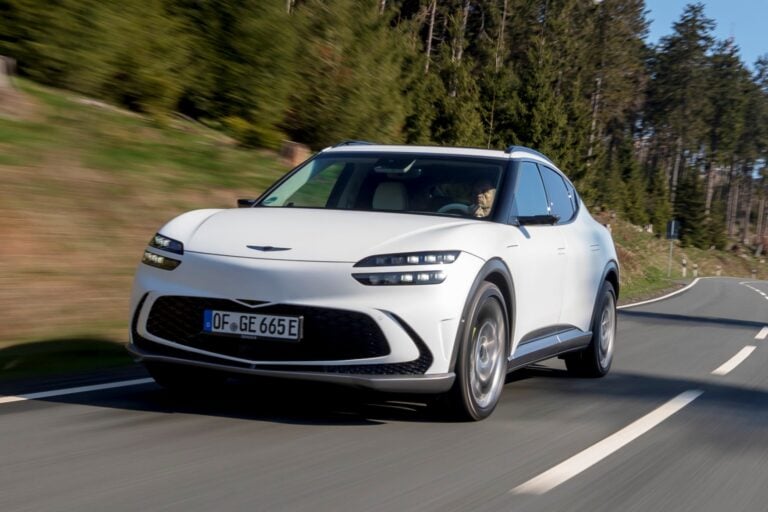 Reviews
Reviews2022 Genesis GV60 EV review: International first drive
Over-sexed, over-priced and over-rated – or is the all-electric Genesis GV60 the new segment leader? Kacher drives it in Frankfurt to find out
-
 News
NewsNew car calendar 2026: All the new cars coming to Australia next year
Here’s the WhichCar by Wheels guide to all the new cars that will launch in Australia in 2026. Check back in regularly for updates...


